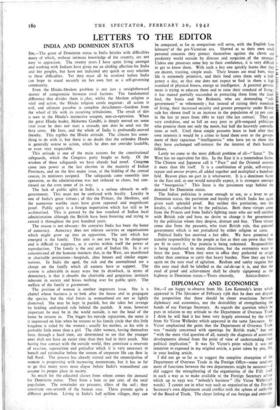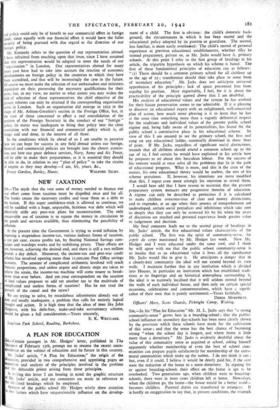DIPLOMACY AND ECONOMICS -
SIR,—I am happy to observe from Mr. Leo Kennedy's letter which appeared in The Spectator of February 13th that he does not dispute the proposition that there should be closer association between diplomacy and economics, nor the desirability of strengthening the hands of our Foreign Secretary. As regards the question which he puts in relation to my attitude to the Department of Overseas Trade I think he will find it has been very largely answered by the letter from Sir Victor Wellesley which appeared in the same Spectator. Sir Victor emphasised the point that the Department of Overseas Trade was " mainly concerned with openings for British trade," but mg " with the most vital question of all, namely the diagnosis of economic developments abroad from the point of view of understanding their political implication." It was Sir Victor's point which it was my intention to expound in my original article, a point taken by you, Sir, in your leading article.
I did not go so far as to suggest the complete absorption of the Department of Overseas Trade in the Foreign Office—some readjust- ment of functions between the two departments might be necessary-1 did suggest the strengthening of the organisation of the F.O. itself in such a way as to make available to the Foreign Secretary advice which up to 1932 was " nobody's business " (Sir Victor Wellesley s words). I cannot see in what way such an organisation of the Foreign Secretary's own department could conflict with the sphere of.authority of the Board of Trade. The closer linking of our foreign and conuner- Gal policy could only be of benefit to our commercial effort in foreign lands, since equally with our financial effort it would have the fuller security of being pursued with due regard to the direction of our foreign policy.
Mr. Kennedy refers to the question of our representation abroad. I have refrained from touching upon that issue, since I have assumed that this representation would be adapted to meet the needs of our "organisation" in London. Our representatives abroad for many years past have had to take into account the reaction of economic developments on foreign policy in the countries to which they have been accredited, and that will be increasingly the case in the future. Of course we must make the selection of our ambassadors and ministers dependent on their possessing the necessary qualifications for their posts, but, in my view, no matter to what extent you may widen the field of selection of these representatives the chief objective of the present reforms can only be attained if the corresponding organisation exists in London. Such an organisation did emerge in 1932 in the shape of Mr. Ashton-Gwatkin's section in the Foreign Office, but, in the view of those concerned to effect a real consolidation of the position of the Foreign Secretary in the conduct of our " foreign " policy, its status was inadequate to bring that policy into the close association with our financial and commercial policy which is, all things said and done, in the interest of all three.
In the conditions which lie ahead of us I am unable to perceive how we can hope for success in any field abroad unless our foreign, financial and commercial policies are brought into the closest associa- tion, nor how our great defence services, Navy, Army and Air Force, will be able to make their preparations, as it is essential they should be able to do, in relation to any "plan of policy" to take the strains of empire as they may develop.—I am, Sir, yours, &c.,



























 Previous page
Previous page